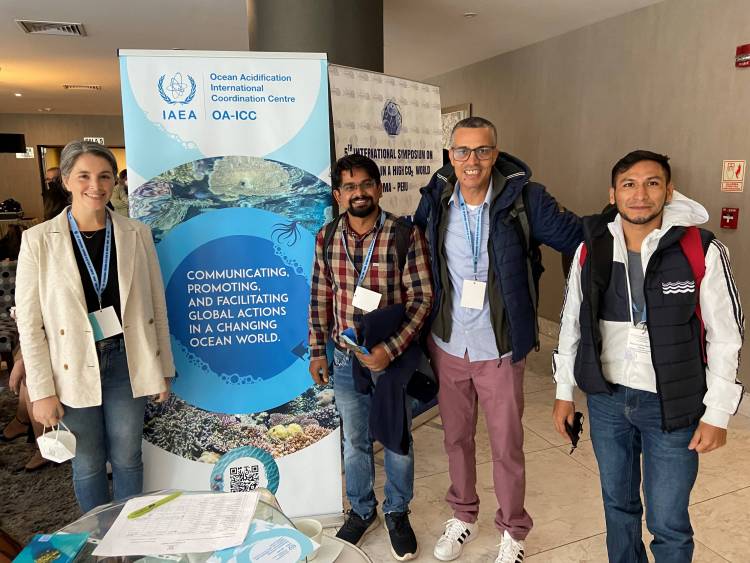As part of its commitment to promote international collaboration, the IAEA highlighted the role nuclear and isotopic techniques can play in assessing the impacts of ocean acidification at the 5th International Symposium on the Ocean in a High CO2 World, held last week in Lima, Peru. In addition to delivering workshops and presentations, the IAEA sponsored the attendance of 18 early career scientists at the event.
Ocean acidification is one of the greatest threats of our time to marine organisms, ecosystems and resources. It occurs when carbon dioxide (CO2) is released into the atmosphere by human activities and is absorbed by the ocean: the ocean takes up about a quarter of all human-made CO2 emitted to the atmosphere each year. The resulting change in the acidity of seawater can have lasting, detrimental effects on fragile marine ecosystems. Impacts of ocean acidification can also have drastic socio-economic consequences in countries that are dependent on marine resources.
"Ocean acidification is now a reality whose economic consequences are clearly noticeable and whose effects could be devastating in the long term for many sectors, starting with the farming and harvesting of many shellfish and crustaceans that are already severely impacted," said Prince Albert II of Monaco, in his opening remarks at the symposium. "We know that these sectors represent vital sources of income and food for millions of people."
Studying the impact of ocean acidification is a high priority for the IAEA. The Ocean Acidification International Coordination Centre (OA-ICC) at the IAEA Marine Environment Laboratories in Monaco, works to communicate, promote and facilitate international activities on ocean acidification in three categories: science, capacity building and communication. It coordinates communication among experts and facilitates outreach to stakeholders, ranging from scientists and policymakers toeducators, the media and the general public.
In line with these goals, the IAEA teamed up with the National University of Pedro Ruiz Gallo, Peru's Institute of the Sea, and the Prince Albert II of Monaco Foundation, as principal sponsors of the #HighCo2 Symposium. The event brought together over 200 scientists, academics, students, government representatives and ocean product entrepreneurs to share research and results on ocean acidification and approaches to mitigation. The IAEA-sponsored 18 early career scientists also presented their research.
"Turning 10 this year, the OA-ICC has been contributing to the advancement of ocean acidification science, through developing and maintaining two databases available to the scientific community, collaboratively funded capacity building opportunities for scientists, and developing standardized best practices," said Ashley Bantelman of the IAEA OA-ICC.
The IAEA hosted two side events at the symposium. The Global Ocean Acidification-Observation Network (GOA-ON) Regional Hub Coordination Workshop offered participants hands-on training in the use of two OA-ICC maintained databases. The annual expert meeting of OA-ICC and Surface Ocean - Lower Atmosphere Study (SOLAS) - Integrated Marine Biosphere Research (IMBeR) Ocean Acidification working group (SIOA) discussed progress made in the field over the past year.
"This symposium marks the beginning of the next phase of ocean acidification science focussing on the data we need to drive solutions and actions," said Sam Dupont, chair of the SIOA working group.
Throughout the week, the symposium discussed six themes: changing carbonate chemistry in coastal to open ocean waters, organism responses and consequences of living in a high CO2 world in a multi-stressor framework, ecological effects of ocean acidification and stressors in a changing ocean, insights from natural ocean acidification analogues, ocean acidification and society, and global to regional policy, actions, communication and capacity building for ocean acidification.
Ocean acidification is now a reality, whose economic consequences are clearly noticeable and whose effects could be devastating in the long term for many sectors.

Three of the 18 early career scientists the IAEA has sponsored to attend the 5th International Symposium on the Ocean in a High CO2 World, Lima, 13-16 September 2022, together with Sarah Flickinger from the IAEA Ocean Acidification International Coordination Centre. (Photo: A.Bantelman/IAEA)






